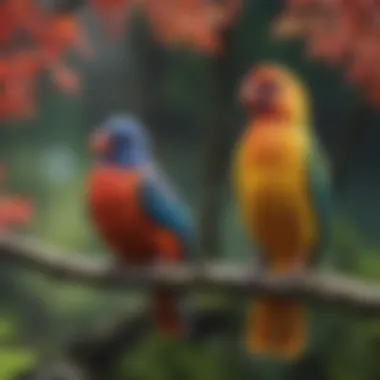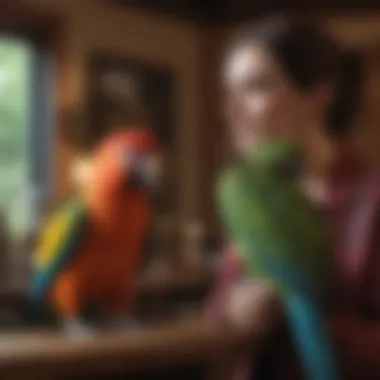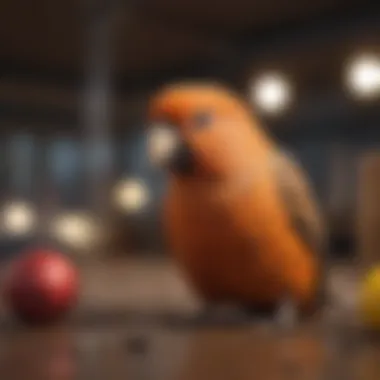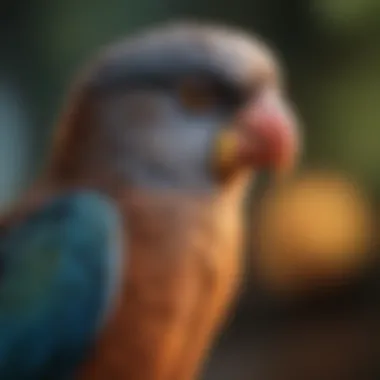Pet Birds in Vancouver: A Complete Ownership Guide


Intro
Pet birds have grown in popularity as companions among Vancouver residents. With an urban lifestyle, people often seek relationships with pets that offer joy without requiring too much space. Various species are available, each bringing unique characteristics. This guide aims to inform potential and current bird owners about everything they need to know to care for their feathered friends, from selecting the right species to recognizing the emotional needs of birds.
Understanding how to show proper care is critical to ensure the health and happiness of pet birds. The following sections will provide detailed insights into avian care basics, ways to develop strong connections with birds, their emotional challenges, health considerations, and several interesting facts about commonly owned bird species in Vancouver.
Avian Care Basics
When bringing a bird into your home, knowing how to meet their daily needs is crucial. Proper preparation and relevant knowledge make a significant difference in ensuring an enriching domestic environment for these sensitive creatures.
Importance of Proper Nutrition
Birds require a balanced diet to stay healthy. An appropriate blend of seeds, pellets, fruits, and vegetables meets their nutritional needs. Nutritional requirements vary by species. Discussing your bird's dietary needs with an avian vet is beneficial. Some general guidelines include:
- Fresh vegetables such as leafy greens and carrots.
- Fruits like apples and berries in small portions.
- High-quality commercial pellets formulated for your species.
Providing fresh water daily is also essential. Avoid giving avian companions excessive sunflower seeds or high-fat foods as they can lead to health issues.
Understanding Bird Species and Their Needs
Not all birds are suitable for every household. For instance, larger birds may need more social interaction and space than smaller species. Factors that influence species selection include:
- Size: Consider how much space you can realistically dedicate to the bird and its hobbies.
- Lifespan: Some species can live for several decades. A long-term commitment is necessary.
- Social Nature: Every bird has unique social habits. Make sure to choose one that fits into your lifestyle.
Basics of Birds Habitat Setup
Creating a comfortable living space involves considering several factors:
- Cage Size: A cage should provide enough space to stretch wings and move around.
- Bedding: Use appropriate bedding to absorb waste and provide comfort.
- Toys: Include safe toys for comfort, interaction, and boredom reduction.
Hanging perches at different heights can help replicate a more natural environment.
Grooming and Hygiene Tips
Maintaining hygienic conditions helps prevent unnecessary health problems. Regular cage cleaning is advised, including:
- Replacing bedding and food.
- Cleaning toys and dishes.
- Bathe birds gently. Ensure that their feathers remain clean and healthy.
Grooming also includes beak and nail care. Identifying a reliable avian veterinarian for health check-ups is also wise.
Interacting with Your Pet Bird
Establishing a relationship built on trust is essential for pet birds. Birds can be wary creatures and may need time to adjust.
Building Trust and Connection
To build trust gradually, remember:
- Easy and patient interactions are key.
- Talking softly can help your bird feel at ease.
- Allow them to explore their environment without aggression.
Training Techniques and Tips
Training your bird not only keeps their mind stimulated but also strengthens your bond. Simple commands Taht can be taught include a.
Foreword to Pet Birds in Vancouver
Pet birds have become increasingly common in Vancouver, a city known for its embrace of diverse lifestyles. As urbanization expands, individuals seek companionship, and birds present unique merits. Their colorful nature and charming behaviors contribute to making them attractive pets. This guide offers a comprehensive look at owning pet birds in Vancouver, catering to various needs for potential and current bird owners.
Understanding the Growing Popularity


In recent years, the interest in pet birds has surged. Many factors contribute to this trend. For one, urban spaces provide essential environments. Compact apartments necessitate small pets, and birds fit well in these confines. Furthermore, their relatively lower maintenance than cats or dogs appeals to busy individuals.
Additionally, social media platforms allow sharing of bird experiences, showcasing their playful and unique traits. Enthusiasts join communities and organizations promoting responsible ownership. Avian lovers find or create social frameworks that nurture connections without requiring much physical space, redefining how humans bond with animals. Local pet shops also play a role by offering varied selections of species to service a growing demand for avian pets.
Benefits of Owning a Pet Bird
Owning a pet bird reveals several benefits rooted in companionship and enjoyment. Birds are neither silent nor commonplace. Their animated presence can uplift moods daily. Creating bonds with birds promotes emotional wellness for both parties, resulting in joy from simple interactions like feeding or teaching them to sing.
Owning birds provides several educational opportunities. Whether observing behaviors or attempting to communicate, bird owners often learn valuable lessons in patience and diligence.
Some particular advantages of keeping birds include:
- Low Space Requirement: Birds adapt well to urban living. They need relatively limited space compared to larger pets.
- Affordability: While initial costs can vary depending on species, ongoing care is often governed primarily by feeding and occasional grooming.
- Fewer Allergens: Avian companions often serve as better choices for those with allergies to furry animals since they tend to have less fur and dander.
In summary, pet birds foster superior dynamic relationships. They enrich the lives of owners while harmonizing well with domestic urban settings in Vancouver.
Common Bird Species in Vancouver
Understanding the variety of bird species available in Vancouver is essential for potential pet owners. Different species come with their unique traits, making it important for one to choose the right species that aligns with their lifestyle and preferences. By examining bird characteristics, social interactions, and care requirements, pet bird owners can make well-informed choices. This section discusses some of the most common species found in the area, highlighting their distinctive positives and downsides.
Parakeets: Colorful Companions
Parakeets, also known as budgerigars, are one of the most popular pet birds in Vancouver. They are known for their vibrant colors and playful demeanor. Their medium size makes them suitable for many living spaces. Parakeets are generally sociable birds and thrive on companionship, often requiring interaction like talking or playing with their owners. They are relatively low-maintenance, making them appropriate for beginners.
Moreover, parakeets have impressive communication skills. With consistent effort, they can develop a good vocabulary and mimic various sounds. Their chatter can be entertaining and adds liveliness to their surroundings, facilitating emotional connections
Canaries: The Singers
Canaries are well regarded for their melodious singing. They come in a spectrum of colors, adding aesthetics to any home. Unlike parakeets, canaries are more solitary. They don't require as much direct interaction with humans, which can suit some busy lifestyles well.
Their song varies significantly based on the breed. For instance, the Serinus canaria is known for its sweet melodies. They do have specific care needs concerning diet and habitat, which can ensure they perform their best vocalizations. Since they prefer to live alone, it’s essential for owners to appreciate their independent nature without expecting direct bonding.
Cockatiels: Popular Pet Choices
Cockatiels are often considered suitable companions for budding bird owners. They are friendly and playful, often exhibiting charming behaviors that can strengthen human relationships. Cockatiels come from larger placements, requiring ample space for safe roaming.
Cockatiels can be trained to whistle tunes and phrases, providing joy to their owners. They’re known to enjoy head scratches and don’t often act defensively, unlike some parrots. A suitable diet including vegetables, seeds, and pellets leads to optimal health \ and happiness.
Larger Parrots: A Commitment
Larger parrots like Amazon or African Grey demand significant attention and commitment from their owners. They are highly intelligent and can form deep connections, leading to profound emotional bonds. Their need for social interaction cannot be overstated; owners typically need to spend multiple hours each day engaging with their pet.
On the downside, larger parrots can also develop behavioral issues if bored or not adequately stimulated. They require spacious environments, social interactions, and a well-rounded diet. A better understanding of their needs prior to acquiring a large parrot ensures a healthier and happier life for both the bird and the owner.
Choosing a pet bird involves careful consideration of the species, their interactions, and you own commitment level. Understanding species dynamics can lead to lasting bonds and gratifying ownership.
Care Essentials for Pet Birds
Taking care of pet birds goes beyond simply providing them a home. It involves understanding their unique needs and ensuring their well-being. Proper care includes nutritional requirements, habitat setups, and grooming routines. Successful care will contribute to a pet bird's happiness and longevity.
Nutritional Needs
Bird nutrition is a pivotal aspect of pet bird health. Nutritional requirements may vary by species, but all pet birds require a balanced diet to maintain their vitality. Proper diets often include pellets, fresh fruits, and vegetables. High-quality seed mixes can be part of a diet but should not be the sole component. Care should be taken to limit seeds high in fat, as these can lead to obesity.
When introducing new foods, do so gradually to avoid upsetting your birds' digestive systems. Providing a variety of foods can prevent boredom and increase overall health. Depending on their species, birds such as cockatiels respond well to offerings of kale, carrots, and peas.
Local Resources for Bird Owners
When it comes to pet bird ownership, having access to local resources is crucial. Pet bird owners in Vancouver can significantly enhance the well-being of their avian companions by utilizing the community offerings available to them. This section highlights several fundamental aspects of local resources, focusing on the essential services, products, and support networks unique to the Vancouver area.


Pet Stores and Supply Outlets
One primary resource for bird owners is local pet stores and supply outlets. Vancouver hosts several specialized stores that cater to the needs of pet birds. These locations often offer a wide range of products, including:
- High-quality bird food tailored to specific species
- Toys and enrichment items
- Cages that comply with proper size and material specifications
- Mandiatory health supplies such as vitamins and supplements
Building a relationship with a local pet store can provide valuable insights. Staff members who are knowledgeable about birds can recommend appropriate care products. They may even offer tips on maintaining optimal health and condition for specific species.
Veterinary Care for Birds
Veterinary care specialists form an essential support system for pet bird owners. In Vancouver, several veterinarians have extensive experience in avian medicine. Regular check-ups are vital for flaunting the overall health of pet birds. Bird owners should seek vets who specialize in avian care to address unique health considerations unique to birds as distinct from other pets.
Services typically include:
- Annual physical exams
- Vaccinations specific to bird species
- Microchipping for identification
- Expertise in treating behavioral problems associated with birds
- Nutritional counseling to supervise dietary habits
Finding a reputable avian veterinarian can be invaluable in navigating bird-specific health challenges.
Bird Rescue Organizations
Bird rescue organizations play another critical role in community support for bird owners. These medical and educational establishments focus on the well-being and rehabilitation of sheltered or abandoned birds.
Some key benefits they offer include:
- Adoption services for potential new pets
- Educational resources about species-specific care
- Events and workshops for community engagement
Participating in rescue efforts enriches pet ownership experiences through exposure to actual needs of less fortunate birds while also promoting responsible pet ownership. In Vancouver, organizations might relay networking opportunities among bird enthusiasts, creating channels of support and friendship.
Understanding Bird Behavior
Understanding bird behavior is fundamental for anyone considering or already owning a pet bird. Birds are sentient beings with unique needs and tendencies. Focusing on how they interact socially, as well as recognizing signs of stress, enhances the bond between the pet and the owner. Such knowledge not only promotes the bird's well-being but also enriches the owner's experience.
Social Needs and Interactions
Birds are inherently social creatures. They communicate using body language, vocalizations, and other cues. This social nature stems from their evolutionary background in the wild, where flocking together is crucial for protection and companionship. Thus, it is essential for pet owners to create an environment that satisfies these social needs.
Owners should spend regular, quality time with their birds. Without proper interaction, a bird can become bored. Boredom often results in destructive behaviors, which can strain the pet-owner relationship. Activities such as talking, playing games, or even singing can stimulate the birds. Additionally, ensure they have access to stimulating toys that mimic their natural behaviors.
Offering companionship to the bird can also be beneficial. Many bird species thrive with a companion. Therefore, if resources permit, adopting another bird can enhance the pet's emotional well-being.
Some key practices to support social needs include:
- Frequent Interaction: Set aside time each day for bonding activities.
- Offering Variety: Provide a range of toys and experiences to keep the bird engaged.
- Companion Species: Consider having a second bird if the species' characteristics align.
Recognizing Stress Signals
Identifying stress in birds is crucial for their health. Birds express stress through specific behaviors and body language. Awareness of these signs allows for prompt action, ensuring the pet's comfort and well-being.
Common stress signals include:
- Feather Plucking: A common sign often indicating psychological distress.
- Excessive Vocalizations: Changes in vocal behavior may indicate discomfort or fear.
- Clinginess or Aggression: This can signal that a bird is feeling threatened or insecure.
Additionally, environmental factors like loud noises or significant changes in surroundings can contribute to a bird's stress levels. Maintaining a stable and quiet environment is key for their well-being.
A suitable response might involve:
- Behavioral Adjustment: Identifying and removing known stressors from the environment.
- Routine Establishment: Birds benefit from consistent routines. Conduct feeding, interaction, and play on predictable schedules.
Training Your Pet Bird


Training your pet bird is often regarded as one of the most crucial aspects within bird ownership. In Vancouver, where interest in avian companionship is rapidly increasing, understanding effective training methods is essential for both the well-being of the bird and the satisfaction of the owner. When birds can respond to commands, not only does their well-being improve due to increased mental stimulation, but they also tend to exhibit lesser behavioral issues. Owners can foster a more beneficial relationship through proper communication and interaction potential.
Basic Commands and Tricks
Teaching basic commands can significantly enhance the bond between the owner and the bird. These commands can range from simple vocal responses to physical actions. An example of a basic command could include training the bird to step up onto your hand when called. This might require several short training sessions focusing on positive reinforcement techniques.
- Select a time where the bird feels attentive and calm.
- Use treats reflecting your bird's diet to inspire enthusiasm.
- Consistently repeat the chosen command, like “step up” while gently guiding them.
- Repeat this process several times to reinforce learning.
Community Engagement and Events
Community engagement around pet birds provides several benefits for bird owners. It fosters a sense of belonging, allowing individuals with shared interests to connect more than just through social media or casual conversations. Participating in local avian events enhances the understanding and appreciation of various bird breeds. Knowledge through other bird owners is paramount. This can lead to more informed decisions regarding care and behavioral training. Ultimately, active participation in community gatherings and clubs translates to improved well-being for birds and owners alike.
Local Bird Shows and Exhibitions
Local bird shows and exhibitions hold great significance in Vancouver. These events serve as platforms for showcasing different bird species and often feature aviculture competitions. Breeders present their birds and eager attendees learn from their experiences. Such exhibitions do not simply display beautiful birds; they provide opportunities for education on proper care, feeding habits, and breeding practices. Visitors receive firsthand insights into the unique traits of many bird species.
Bird shows also highlight the latest industry developments. They may host seminars, workshops, and guest speakers. This unique gatherings cover topics ranging from bird nutrition to effective training methodologies. Such interactions deepen the understanding of avian characteristics while allowing for networking opportunities.
Attending local bird shows may also promote awareness about bird conservation. Many public events collaborate with rescues, educational organizations, and experts to inform attendees about environments and habitat protection for wild birds. The dynamic nature of these events enriches local bird cultures.
Clubs and Groups for Bird Enthusiasts
Clubs and groups for bird enthusiasts are vital resources for pet bird owners. These organizations provide support and connection among like-minded individuals. Joining a local club can markedly improve individual knowledge on various bird species through shared experiences and activities. Members who are seasoned bird owners can mentor newcomers, offering guidance in essential areas like care routines and health considerations.
Additionally, clubs often organize events such as forums, social gatherings, and learning sessions. These events cease to feel intimidating as owners build familiarity over time. Participating fosters friendships based on a shared passion.
Engagement also facilitates collaboration with local veterinarians and specialized healthcare professionals, benefiting birds significantly. Members may host discussions regarding avian health trends and maintenance strategies.
Many clubs utilize online platforms, such as Facebook groups or subreddits, to keep members connected, even over geographical distances. This enhances communication flows about new resources and promotions within the community. Ultimately, it underlines avian specialists' support, leading to impactful friendships and knowledge growth.
Aviculture cares not just for individual species but safeguards a vibrant community of enthusiasts and pets.
Having such connections engages and supports careful stewardship amongst avian owners in Vancouver, leading to enriched relationships for pet birds and their families.
Emotional Bonds Between Birds and Owners
The emotional connection formed between pet birds and their owners is complex and profound. Recognizing this bond can drastically improve both the bird's quality of life and owner satisfaction. Understanding attachment helps pet parents establish a meaningful relationship while considering the unique social needs of their feathered companions.
Understanding Attachment in Birds
Birds are inherently social creatures. In the wild, they thrive in flocks, which provide safety and social interaction. Pet birds, although domesticated, retain this need for companionship. Therefore, when a bird is integrated into a home, it often seeks a strong attachment with its owner.
Various factors influence this bond. First, consistent handling and positive interactions are crucial in fostering attachment. Engaging in activities like talking, singing, or feeding can reinforce trust. A bird might show signs of attachment through behaviors like preening, vocalizing, or mimicking speech.
An attentive owner will notice these signals, recognizing the commitment expected. Some birds may become more reserved in new environments but can warm up with sustained effort and empathy.
Understanding why attachment occurs defines how effectively owners engage with their birds. A knowledgeable bird parent can enhance the emotional bond through informed care and interaction techniques.
Supporting Mental Health for Pet Birds
Supporting the mental health of pet birds requires recognizing their emotional and psychological needs. Creating an environment that nurtures their well-being is fundamentally important. Just as people experience stress, birds can also show signs of anxiety or fear, often resulting in behavioral changes.
Key Strategies for Maintaining a Bird’s Mental Health
- Stimulating Environment: Ensure the birds' living space offers plenty of toys, perches, and opportunities for exploration. Choose toys that challenge them, aiding their natural instinct to play and engage.
- Structured Routine: Birds feel more secure when they know what to expect. Regular feeding and play times can help ease anxiety.
- Social Interaction: Regular socialization with both the owner and additional non-threatening animals can prevent loneliness and encourage a healthy, confident demeanor.
- Nurturing Behavior: Pay attention to the bird's body language. If a bird seems stressed or withdrawn, take steps to create a more calming environment.
As owners become attuned to their birds' needs, they foster stronger emotional connections. A positive emotional environment serves both the bird and the owner, creating a fulfilling companionship.
Understanding the concept of bird attachment sheds light on the significant bond between birds and their caretakers. This bond enriches the lives of both parties, imbuing them with shared experiences and emotional growth.
End
The discussion on pet bird ownership holds significant relevance in urban settings like Vancouver. As more individuals choose birds as companions, understanding both the practical and emotional aspects of this choice becomes crucial. The journey of owning a pet bird is not merely about having a lively creature at home, but also about the connection formed between the bird and its owner.
Future Trends in Bird Ownership
The future landscape of bird ownership seems poised to evolve in interesting ways. The growing passion for these creatures brings forth several emerging trends that inform prospective and current bird owners alike.
- Sustainability in Bird Care: As standard pet care practices gather attention, environmentally friendly products become more mainstream. Bird owners increasingly prioritize organic food, eco-friendly cages, and recycled materials for toys and accessories. This conscientious approach reflects wider societal shifts towards sustainability.
- Innovative Training Techniques: New training methods focus on enriching the lives of pet birds. Positive reinforcement, for instance, is anticipated to become best practice, mirroring trends in their mammal counterparts. Methods that further engage their minds are preferred, as they replicate natural behaviors, enhancing well-being.
- Increased Use of Technology: As technology continues to pervade all aspects of life, it is likely that pet bird ownership will not be left behind. From social media platforms that connect bird admirers to apps that offer training tips, technology will play a fundamental role in shaping relationships with pets.
- Community Initiatives: Activities such as community bird walks, exchanges, or educational workshops will foster stronger connections among bird owners. Interaction with expert or other bird enthusiasts helps in sharing best practices and enables support systems.
- Focus on Ethical Breeding: With knowledge surrounding their care growing, informed owners will push for ethical breeding practices. This increasingly demanding consumer behavior will likely shape local markets and rescue organizations.















